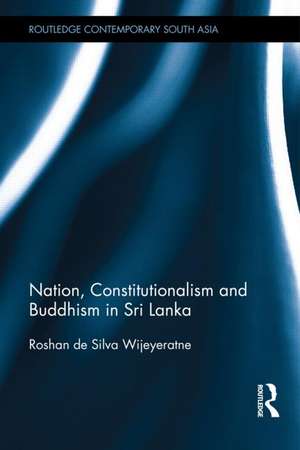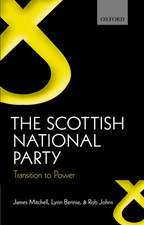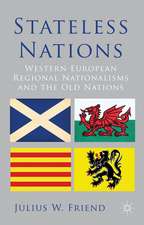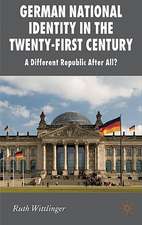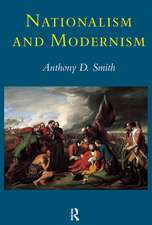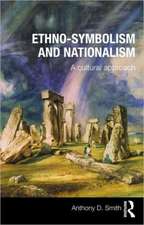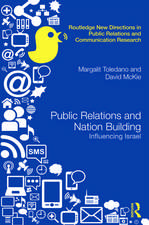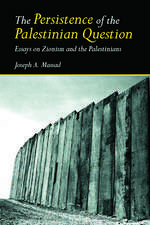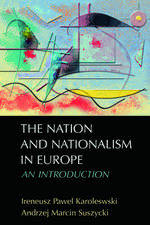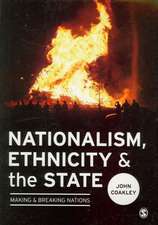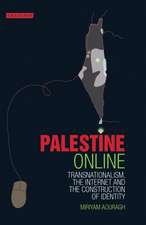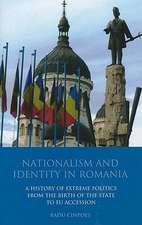Nation, Constitutionalism and Buddhism in Sri Lanka: Routledge Contemporary South Asia Series
Autor Roshan de Silva Wijeyeratneen Limba Engleză Hardback – aug 2013
In this insightful analysis modern Sinhalese Buddhist nationalism, then, emerges through the conjunction of discourse, power and knowledge at a distinct moment in the trajectory of the colonial State. An intrinsic feature of this modernist moment is that premodern categories (such as the cosmic order) were subject to a bureaucratic re-valuation that generated profound consequences for State-society relations and the wider constitutional/legal imaginary. This book goes onto explore how key constitutional and nation-building moments were framed within the cultural milieu of modern Sinhalese Buddhist nationalism – a nationalism that reveals the power of a re-valued Buddhist cosmic order to still inform the present.
Given the intensification of the Sinhalese Buddhist nationalist project following the defeat of the Tamil Tigers in 2009, this book is of interest to scholars of nationalism, South Asian studies, the anthropology of ritual, and comparative legal history.
| Toate formatele și edițiile | Preț | Express |
|---|---|---|
| Paperback (1) | 299.52 lei 6-8 săpt. | |
| Taylor & Francis – 12 oct 2017 | 299.52 lei 6-8 săpt. | |
| Hardback (1) | 823.63 lei 6-8 săpt. | |
| Taylor & Francis – aug 2013 | 823.63 lei 6-8 săpt. |
Din seria Routledge Contemporary South Asia Series
-
 Preț: 393.90 lei
Preț: 393.90 lei -
 Preț: 310.08 lei
Preț: 310.08 lei - 8%
 Preț: 389.83 lei
Preț: 389.83 lei -
 Preț: 296.64 lei
Preț: 296.64 lei -
 Preț: 316.71 lei
Preț: 316.71 lei -
 Preț: 313.81 lei
Preț: 313.81 lei -
 Preț: 349.02 lei
Preț: 349.02 lei - 9%
 Preț: 1035.76 lei
Preț: 1035.76 lei - 18%
 Preț: 1056.00 lei
Preț: 1056.00 lei - 26%
 Preț: 848.40 lei
Preț: 848.40 lei - 18%
 Preț: 1059.48 lei
Preț: 1059.48 lei - 18%
 Preț: 1063.41 lei
Preț: 1063.41 lei - 18%
 Preț: 1060.87 lei
Preț: 1060.87 lei - 18%
 Preț: 1057.26 lei
Preț: 1057.26 lei - 18%
 Preț: 1057.75 lei
Preț: 1057.75 lei - 18%
 Preț: 1061.93 lei
Preț: 1061.93 lei - 18%
 Preț: 1057.05 lei
Preț: 1057.05 lei - 18%
 Preț: 1062.98 lei
Preț: 1062.98 lei - 18%
 Preț: 1049.21 lei
Preț: 1049.21 lei - 18%
 Preț: 1058.79 lei
Preț: 1058.79 lei - 18%
 Preț: 1057.09 lei
Preț: 1057.09 lei - 18%
 Preț: 705.87 lei
Preț: 705.87 lei - 18%
 Preț: 1054.97 lei
Preț: 1054.97 lei - 18%
 Preț: 1109.42 lei
Preț: 1109.42 lei - 18%
 Preț: 1169.78 lei
Preț: 1169.78 lei - 26%
 Preț: 846.42 lei
Preț: 846.42 lei - 18%
 Preț: 1054.71 lei
Preț: 1054.71 lei - 18%
 Preț: 1057.75 lei
Preț: 1057.75 lei - 18%
 Preț: 1062.98 lei
Preț: 1062.98 lei - 26%
 Preț: 822.36 lei
Preț: 822.36 lei - 26%
 Preț: 848.15 lei
Preț: 848.15 lei - 18%
 Preț: 1053.92 lei
Preț: 1053.92 lei - 18%
 Preț: 698.58 lei
Preț: 698.58 lei - 18%
 Preț: 1058.79 lei
Preț: 1058.79 lei - 18%
 Preț: 1062.98 lei
Preț: 1062.98 lei - 18%
 Preț: 1057.75 lei
Preț: 1057.75 lei - 18%
 Preț: 1060.87 lei
Preț: 1060.87 lei - 18%
 Preț: 1057.40 lei
Preț: 1057.40 lei - 18%
 Preț: 1057.13 lei
Preț: 1057.13 lei - 18%
 Preț: 1165.87 lei
Preț: 1165.87 lei - 25%
 Preț: 823.63 lei
Preț: 823.63 lei - 18%
 Preț: 1059.48 lei
Preț: 1059.48 lei -
 Preț: 378.43 lei
Preț: 378.43 lei - 18%
 Preț: 1055.51 lei
Preț: 1055.51 lei - 18%
 Preț: 1057.75 lei
Preț: 1057.75 lei - 18%
 Preț: 1227.38 lei
Preț: 1227.38 lei - 26%
 Preț: 850.37 lei
Preț: 850.37 lei - 18%
 Preț: 1166.01 lei
Preț: 1166.01 lei
Preț: 823.63 lei
Preț vechi: 1104.96 lei
-25% Nou
Puncte Express: 1235
Preț estimativ în valută:
157.60€ • 164.55$ • 130.43£
157.60€ • 164.55$ • 130.43£
Carte tipărită la comandă
Livrare economică 05-19 aprilie
Preluare comenzi: 021 569.72.76
Specificații
ISBN-13: 9780415462662
ISBN-10: 0415462665
Pagini: 272
Ilustrații: 4 b/w images and 4 halftones
Dimensiuni: 156 x 234 x 23 mm
Greutate: 0.66 kg
Ediția:New.
Editura: Taylor & Francis
Colecția Routledge
Seria Routledge Contemporary South Asia Series
Locul publicării:Oxford, United Kingdom
ISBN-10: 0415462665
Pagini: 272
Ilustrații: 4 b/w images and 4 halftones
Dimensiuni: 156 x 234 x 23 mm
Greutate: 0.66 kg
Ediția:New.
Editura: Taylor & Francis
Colecția Routledge
Seria Routledge Contemporary South Asia Series
Locul publicării:Oxford, United Kingdom
Public țintă
PostgraduateCuprins
Introduction: Sri Lankan Nationalism and the Presence of the Past: Towards a Hermeneutic Perspective 1. The Mahāvamsa as History and The Pre-History of State Formation 2. The Cosmology of Buddhism, the Pāli Chronicles and the Ontology of Evil 3. Textual Practices, Sinhalese Buddhist Consciousness and Dissonance 4. Galactic Polities, Cosmography and the Imaginary of Buddhist Sovereignty 5. The Transformation of Sinhalese Buddhist Consciousness in Its Colonial and Postcolonial Relation 6. Independence, Land, Citizenship and the Cosmic Order 7. Sinhalese Revolutionaries, Linguistic Nationalism and Buddhism Reimagined 8. Cosmology, Constitutionalism and the Tamil as Other 9. Centralization, Decentralization and the Cosmology of Buddhism 10. Conclusion: Rethinking Community in Sri Lanka
Notă biografică
Roshan de Silva Wijeyeratne is Lecturer in Law at Griffith Law School, Griffith University, Queensland, Australia. He graduated from the School of Oriental and African Studies (University of London) and completed his doctorate at the University of Kent (U.K). He teaches courses in Native Title, Law and Culture, the Legal History of Asia and the Middle East, and Property Law.
Recenzii
'This important study convincingly demonstrates how the nationalist nightmare in Sri Lanka relies on exclusion of non-Buddhist ideas to underpin the eradication/expulsion of non-Buddhists from this idyllic island. While this suggests blame for Buddhism, ‘religion’ or ‘tradition’, an equally strong finding is that state-centric abuses of power continue to occur with impunity.'
Werner Menski, SOAS, University of London, UK
'Roshan de Silva Wijeyeratne weaves an innovative argument on the nexus between community and nation in late colonial and post colonial Sri Lanka where the incorporation of communities through reassertion and restoration of state power overrides exclusionary urges. This lucid and critical account of the way Buddhism and politics are interlaced in contemporary Sri Lanka will be invaluable for scholars and students from a variety of disciplines'
Nira Wickramasinghe, Leiden University, the Netherlands
"The book addresses the issues at stake in an original way… De Silva Wijeyeratne goes beyond the standard postcolonial interpretation that grants European colonial institutions exclusive power to silence or misread native categories, and emphasizes instead the ways in which Sinhalese native (Buddhist) categories oriented the adoption of colonial systems and their implementation”
International Journal for the Semiotics of Law, Professor Fabio Rambelli, University of California, Santa Barbara
“The historical scope of the book is vast, moving quickly from the fifth century to the present and focuses much more on nationalism than on constitutionalism. Yet its scope and focus make for an intriguing take on a form of ethnoreligious nationalism that seems to be gaining new energy and impetus in recent years.”
Dr Benjamin Schonthal, Religious Studies Review (Vol. 40, 4, 234-35)
"This book is a very well-judged and well-written book that uncovers one of the elisions in modern western perceptions: preoccupied with militant and exclusionary Islam, and immersed in sound bite aphorisms about Buddhist goodness and compassion, the notion of a militant, exclusionary and violent Buddhism, closely allied to an ethnic nationalism, and capable of great brutality and cynical political gamesmanship, has hardly surfaced in the West.”
The Round Table: The Commonwealth Journal of International Affairs (104, 2, 240-41), Professor Stephen Chan School of Oriental & African Studies, University of London
“A welcome contribution to the current literature on the Sri Lankan civil war for at least two important reasons. First, unlike some other treatises on this subject, Wijeyeratne approaches the civil war in a sober, unbiased manner...This monograph is an illuminating study that deserves to be widely read. Anyone interested in the political and cultural circumstances of the Sri Lankan civil war will gain much from this book. In addition, this book will be extremely useful as a general teaching aid in the delivery of courses on Sri Lankan history." - James John Stewart, South Asia Research Vol. 34 (3): 285-288
Werner Menski, SOAS, University of London, UK
'Roshan de Silva Wijeyeratne weaves an innovative argument on the nexus between community and nation in late colonial and post colonial Sri Lanka where the incorporation of communities through reassertion and restoration of state power overrides exclusionary urges. This lucid and critical account of the way Buddhism and politics are interlaced in contemporary Sri Lanka will be invaluable for scholars and students from a variety of disciplines'
Nira Wickramasinghe, Leiden University, the Netherlands
"The book addresses the issues at stake in an original way… De Silva Wijeyeratne goes beyond the standard postcolonial interpretation that grants European colonial institutions exclusive power to silence or misread native categories, and emphasizes instead the ways in which Sinhalese native (Buddhist) categories oriented the adoption of colonial systems and their implementation”
International Journal for the Semiotics of Law, Professor Fabio Rambelli, University of California, Santa Barbara
“The historical scope of the book is vast, moving quickly from the fifth century to the present and focuses much more on nationalism than on constitutionalism. Yet its scope and focus make for an intriguing take on a form of ethnoreligious nationalism that seems to be gaining new energy and impetus in recent years.”
Dr Benjamin Schonthal, Religious Studies Review (Vol. 40, 4, 234-35)
"This book is a very well-judged and well-written book that uncovers one of the elisions in modern western perceptions: preoccupied with militant and exclusionary Islam, and immersed in sound bite aphorisms about Buddhist goodness and compassion, the notion of a militant, exclusionary and violent Buddhism, closely allied to an ethnic nationalism, and capable of great brutality and cynical political gamesmanship, has hardly surfaced in the West.”
The Round Table: The Commonwealth Journal of International Affairs (104, 2, 240-41), Professor Stephen Chan School of Oriental & African Studies, University of London
“A welcome contribution to the current literature on the Sri Lankan civil war for at least two important reasons. First, unlike some other treatises on this subject, Wijeyeratne approaches the civil war in a sober, unbiased manner...This monograph is an illuminating study that deserves to be widely read. Anyone interested in the political and cultural circumstances of the Sri Lankan civil war will gain much from this book. In addition, this book will be extremely useful as a general teaching aid in the delivery of courses on Sri Lankan history." - James John Stewart, South Asia Research Vol. 34 (3): 285-288
Descriere
Focusing on Sri Lanka, this book offers a new perspective on contemporary debates about nationalism in South Asia. It looks at the ‘capture’ of Buddhism by militant Sinhalese nationalism in the colonial and postcolonial periods, and the framing of subsequent key constitutional legal moments.
